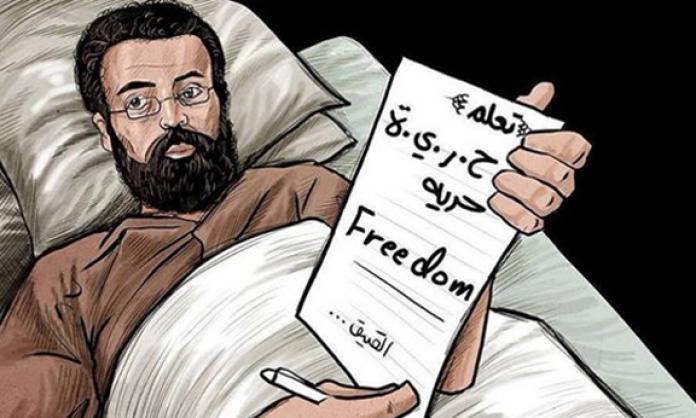By Friday, 29 January, Palestinian journalist Mohammed al-Qeq had spent 66 days on hunger strike in Israeli jails. Just before he fell into his third coma, a day earlier, he sent a public message through his lawyers, the gist of which was: freedom or death.
Al-Qeq is 33 years of age, married and a father of two. Photos circulating of him online and on Palestinian streets show the face of a bespectacled, handsome man. The reality though is quite different. “He’s in a very bad situation. He fell into his third coma in recent days, and his weight has dropped to 30 kilograms”, Ashraf Abu Sneina, one of al-Qeq’s attorneys, told Al Jazeera. Al-Qeq was arrested under yet another notorious Israeli law called the “administrative detention” law.
Ominous predictions of al-Qeq’s imminent death have been looming for days with no end in sight to his ordeal. Unfortunately for a man who believes that the only tool of defence and protest he has against apartheid Israel is his body, the Red Cross and other international groups took many days to so much as acknowledge the case of this reporter, who had refused food and medical treatment since 24 November.
He is striking on behalf of all political prisoners.
Under the administrative detention law, Israel has held Palestinians and Arab prisoners without offering reasons for their arrests, practically since the state was founded in 1948.
Khader Adnan, 37, from Jenin, was held under administrative detention for years. Israeli intelligence had no evidence to indict him on any particular charge, despite accusations that he was a valued member of the Islamic Jihad organisation.
He was set free on 12 July last year. This occurred only after he too resorted to hunger strikes, and two particularly long ones: early in 2012 a hunger strike lasted for 66 days, and another, in May 2015, lasted for 56 days.
Each time, Adnan reached the point where death, as is the case for al-Qeq, was also becoming a real possibility. When we asked him what compelled him to follow that dangerous path twice, his answer was immediate: “Repeated arrests, the savagery of the way I was arrested, the brutality of the interrogation and finally the prolonged administrative detention” – without trial.
Administrative detentions are legal black holes. They offer no escape routes and no rights for the prisoner whatsoever, but win the interrogators time to break the spirit of the prisoner, forcing him or her to surrender or even admit, under torture, to things that he or she never committed in the first place.
“It is our last and only choice”, says Mohammed Allan, 33, from Nablus, who underwent a hunger strike for so long that it resulted in brain damage, and nearly cost him his life.
“When you feel that all the doors are sealed, and you stand there humiliated and alone, knowing in advance that the court system is a charade, one is left with no other option but a hunger strike”, he says.
“First, I made my intentions clear by refusing three meals in a row, and by sending a written note. Then, the punishment commences. It is like a psychological warfare between the prison authorities, state and legal system apparatuses against a single individual”, which, according to Allan, lasts for 50-60 days.
“Almost instantly, a hunger striker is thrown into solitary confinement, denied access to a mattress and blanket and other basic necessities. Only after six weeks or so do Israeli prison authorities agree to talk to lawyers representing hunger strikers to discuss various proposals.
“But within that period of time, the prisoner is left entirely unaided, separated from the other prisoners and subjected to an uninterrupted campaign of intimidation and threats. Mental torture is far worse than hunger”, says Allan.
“You cannot even go to the bathroom anymore; you cannot stand on your own; you are even too weak to wipe the vomit that involuntarily gushes out of your mouth into your beard and chest.”
Allan almost died in prison, and despite a court order that permitted prison authorities to force-feed him (a practice seen internationally as a form of torture), doctors at Soroka hospital refused to act upon the instructions. In mid-August 2015, Allan was placed on life support when he lost consciousness.
A third freed hunger striker, Ayman Sharawneh, originally from Dura, Hebron, but who has been deported to Gaza, describes hunger strikes as the “last bullet” in a fight for freedom that could possibly end in death. Sharawneh, like Adnan and others we talked to, was bitter about the lack of adequate support he received while dying in jail.
“All organisations, Palestinian or international, usually fall short”, he says. “They spring into action after the prisoner had gone through many days of torture.”
He agrees with Adnan that individual hunger strikes should not be understood as a self-centred act. “Mohammed Al-Qeq is not striking for himself”, says Adnan. “He is striking on behalf of all political prisoners.”
Ramzy Baroud is the founder of the Palestine Chronicle. This piece was first published at RamzyBaroud.net. He will be speaking at the Marxism conference in Melbourne over the Easter weekend.





